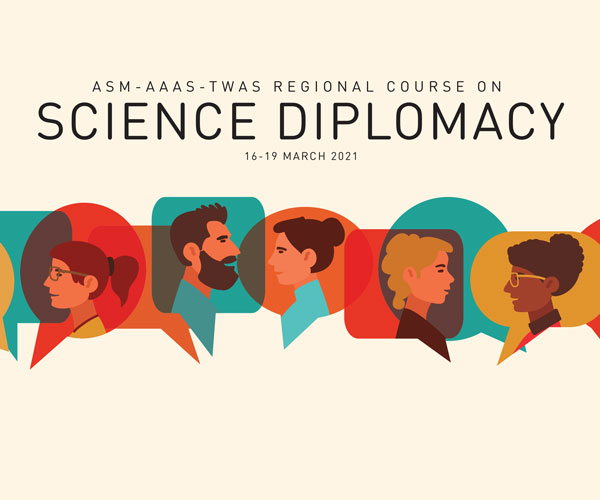After an intensive four days of training at the Asia-Pacific region’s first-ever course on science diplomacy, the 56 scientists and policymakers from around the world who participated were asked what science diplomacy meant to them in just one word. “Collaboration” and “communication” emerged as the most popular answers — two themes that resonated throughout the virtual course, held 16–19 March.
“There is no better time than now to engage in science diplomacy,” said Hazami Habib, Chief Executive Officer of Akademi Sains Malaysia (ASM), the national scientific academy that co-hosted the course alongside the American Association for the Advancement of Science (AAAS) and TWAS.
The COVID-19 pandemic was “a wake-up call” for science diplomats to address a range of issues “in which science, technology and the society are tightly intertwined,” emphasized Khatijah Yusoff, Chair of the course’s organizing committee and ASM council member.
Many of the course’s speakers underlined the need for nations to collaborate across boundaries so that that the scientific community can address issues such as the COVID-19 and climate change.
“To meet this increased demand, trained science diplomats are needed,” added Kimberly Montgomery, Director of International Affairs and Science Diplomacy at AAAS. The course, organized annually by AAAS and TWAS since 2014, trains scientists and policymakers and fosters the necessary connections that allow science diplomacy to address key issues, Montgomery said. In recent years, regionally focused workshops took place in Namibia, South Africa and Egypt.
Despite the focus on the Asia-Pacific region, the course was a truly global event, bringing together 56 participants from 29 countries across Asia, Africa and the Americas, as well as 33 speakers and moderators also from multiple continents.
Accordingly, the agenda emphasized opportunities for collaboration, with participants working together on case study presentations delivered on the course’s final day. Participants took part in interactive icebreakers, attended professional development sessions on science diplomacy careers and communicating science, and learned from keynote speeches and panel discussions about the breadth of science diplomacy.
Several speakers noted that science diplomacy also encompasses scientific evidence and understanding that inform policy and diplomatic effort; and offered many examples of how it is built on collaboration.
In Antarctica, for instance, any data gathered is available to anyone in the world through the International Science Council World Data System, according to Salleh Mohd Nor, a senior fellow at ASM.
“Research in this harsh environment is extremely challenging,” said Salleh, underlining the logistical difficulty and expense. Yet, this system of collaboration opens up many research opportunities on a range of subjects — from organism survival and adaptation to space observation — including those from non-polar countries like Malaysia.
“International cooperation is so vitally important to study Antarctica for the benefit of mankind,” he said, adding that the value of the research that emerges from Antarctica will continue to increase in the face of climate change.
Beyond the research outcomes that result from science diplomacy, there are benefits too in building relationships between nations, said Lindsay Falvey, Commissioner of the Australian Centre for International Agricultural Research.
Despite being a relatively small part of Australia’s budget, agricultural science partnerships, which also extends to neighbouring countries, also builds long-term trust between participants, creating “a feeling of reciprocity,” Falvey said.
Speakers also offered advice about engaging in science diplomacy, providing insight on how best to build that trust.
TWAS Fellow Zakri Abdul Hamid, the former Science Advisor to the Prime Minister of Malaysia, discussed the importance of members of the scientific community convincing policymakers of key science-informed issues, such as biodiversity loss. To effectively convince policymakers, those engaged in science diplomacy must be credible, relevant and legitimate, Zakri said, adding that “the scientific community is not a bystander in trying to solve these global challenges”.
Speakers also offered suggestions for staying involved in the realm of science diplomacy after the conclusion of the course.
Sena Galazzi, Associate Programme Officer for TWAS, told participants that they were now part of the science diplomacy family. She said that, after they have used what they learned in the workshop in the professional world, the Academy would want to hear from them again.
“Over the years, we have built strong friendships with a wide-ranging cohort of alumni who are doing some amazing things out there,” Galazzi said. “They are starting their own science diplomacy networks, they are organizing local workshops, and they are lobbying their institutes to integrate science diplomacy in their work. I know you will also be doing some extraordinary things.”
“What was really palpable was the passion, the desire and the conviction of each and every one of you in wanting to do something, change something,” said Sok Ching Cheong, a fellow at ASM and Co-Chair of TWAS Young Affiliate Network.
Adapted from an article by AAAS, available here.

